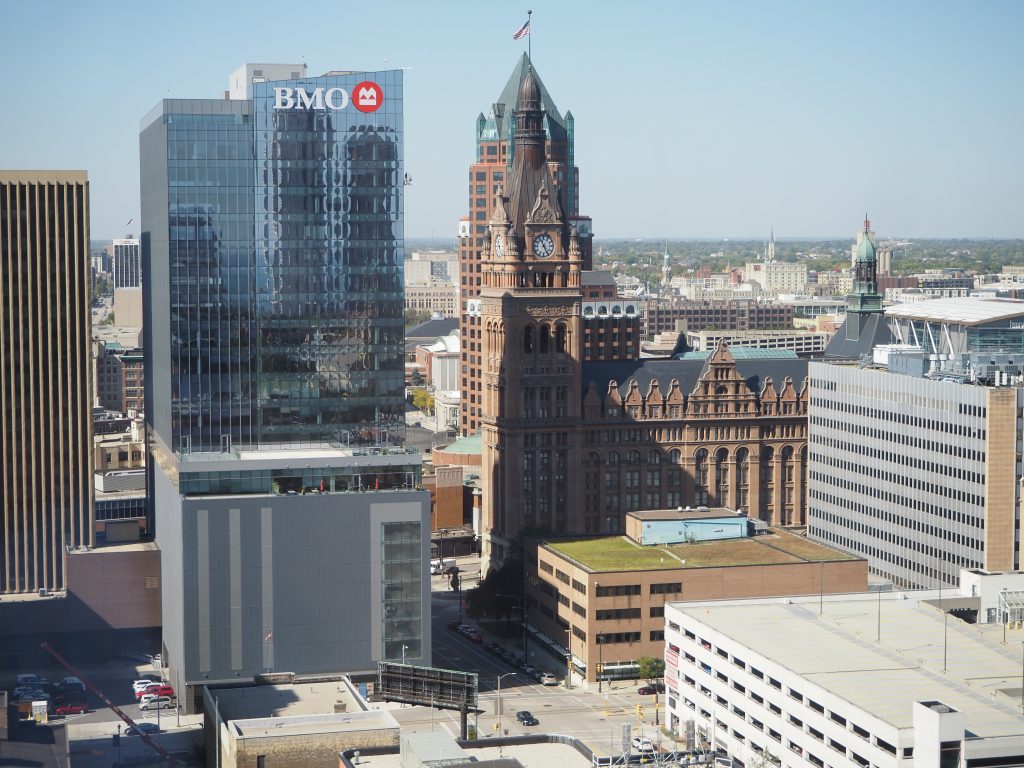Policy Forum Says Milwaukee’s Future Finances Are “Precarious”
But Act 12 has delivered substantial benefits to city's fiscal health.
While it appears poised to avoid significant cuts or tax and fee increases in 2025, the Wisconsin Policy Forum believes the City of Milwaukee’s future financial condition is “precarious.”
“Indeed, city officials, residents and businesses should justifiably view the proposed budget with optimism and relief. At the same time, however, they should keep in mind that the city’s structural challenges have not disappeared and may soon intensify, and that future budgets are far less likely to produce the same positive feelings as this one,” says the nonpartisan organization’s 19-page budget analysis.
For years, the annual budget analysis warned of the city’s increasingly dire financial situation. Costs, especially for services like public safety, were rising and the city’s limited mix of available revenue streams were not keeping pace.
However, the institution of a 2% city sales tax and increased shared revenue from the state dramatically changed the picture.
Mayor Cavalier Johnson and the Common Council had the benefit of crafting the 2024 budget with both pandemic-triggered federal American Rescue Act Plan Act (ARPA) funding and the new sales tax. Now they’ve lost ARPA. Federal regulations prevent the use of any remaining grant funds for filling budget holes in 2025 and beyond.
The 2025 budget cycle, according to a memo from budget director Nik Kovac, started with a $87 million structural deficit.
The report’s authors, senior research associate Ari Brown and immediate past president Rob Henken, are warning that the city’s primary method of closing the gap isn’t likely to be sustainable in the future.
While higher than expected sales tax revenues, $10 million in cuts and increased fees will close some of the gap, Johnson and Kovac intend to close more than $44 million of the gap by withdrawing from reserve funds.
The prior budget prepared the city for this, replenishing the funds while drawing down the ARPA grant. But now the city is tapping the tax stabilization fund for the maximum allowed withdrawal, $32.3 million. It will also make withdrawals from the public debt amortization fund and the transportation fund, fueled primarily by parking revenue.
The city will need future costs, including health care, to remain at budgeted levels and revenues to continue to trend upward to refill the stabilization fund.
The Wisconsin Policy Forum is issuing a warning that it doesn’t think that will be the case. In part, because of the requirements of the sales tax deal.
“Meanwhile, increases in Act 12-related costs appear inevitable as the city responds to its mandate to increase police and fire staffing levels and as ongoing labor negotiations with the Milwaukee police and fire unions are resolved,” says the report.
Another issue beyond the ability to continue to draw down reserves is the ability to fund infrastructure investments. Due to the age of the city’s roads, bridges and other infrastructure, and the growing cost to replace them, the city’s capital borrowing continues to grow. That will, the report warns, continue to create a drag on the city’s budget as it must grapple with paying off the debt.
“Unfortunately, there is no obvious solution to the city’s infrastructure challenge,” says the report. “Threading the needle between addressing critical infrastructure needs and managing the affordability of increased debt, therefore, will be one of the most difficult tests for city leaders in the years ahead.”
While a new sales tax should grow with inflation and help the city’s bottom line, it could also crash with a recession and unravel the city’s fund withdrawal strategy.
“These factors… forewarn the potential of higher annual increases in property taxes and fees than city property owners have been accustomed to in recent years,” says the report.
The report asks city officials to expedite work on a Greater Milwaukee Committee initiated report and a Wisconsin Policy Forum project to share services with Milwaukee County.
“Some of those options are being reviewed by city leaders, while many others undoubtedly have or will be deemed impractical or ineffective,” says the report. “But regardless of whether these or other options are considered, it is clear that future solutions to the city’s ongoing financial challenges are less likely to come from Madison, and that the need to scour city operations for savings opportunities will grow. It is equally clear that with another somewhat unexpected year of relative budgetary calm, the next several months provide an opportune time to accelerate the search for locally generated solutions.”
A public hearing on the budget is scheduled for Oct. 7 at 6:30 p.m. in the Common Council chambers, 200 E. Wells St. The council will spend the next month reviewing the budget proposal and introducing amendments before a formal vote on adoption in November.
A copy of the full report is available to read for Urban Milwaukee members.
Legislation Link - Urban Milwaukee members see direct links to legislation mentioned in this article. Join today
If you think stories like this are important, become a member of Urban Milwaukee and help support real, independent journalism. Plus you get some cool added benefits.
More about the 2025 City of Milwaukee budget
- Milwaukee Creates Economic Hardship Waiver For Keeping Chickens - Nick Rommel - Dec 27th, 2024
- What’s In The 18 Footnotes Added To Milwaukee’s Budget? - Jeramey Jannene - Dec 12th, 2024
- Council Rejects Mayor’s Vetoes, Finalizes 2025 Budget - Jeramey Jannene - Nov 26th, 2024
- City Hall: Mayor Johnson Issues Several Budget Vetoes - Jeramey Jannene - Nov 20th, 2024
- Milwaukee Fire Department Announces New Organizational Changes and Personnel Enhancements in Response to 2025 Budget - Ald. Peter Burgelis - Nov 18th, 2024
- Council Boosts Road Repair In Adopting 2025 Milwaukee Budget - Jeramey Jannene - Nov 8th, 2024
- Council adopts Ald. Burgelis Amendment to Address Decades-Long Underfunding of Local Roads - Ald. Peter Burgelis - Nov 8th, 2024
- Budget amendment adopted to bolster sworn personnel recruitment efforts - Ald. Peter Burgelis - Nov 8th, 2024
- Common Council adopts amended 2025 City budget - Ald. Marina Dimitrijevic - Nov 8th, 2024
- Alderwoman Coggs sponsors budget amendments aimed at improving services, supporting residents - Ald. Milele Coggs - Nov 8th, 2024
Read more about 2025 City of Milwaukee budget here
Political Contributions Tracker
Displaying political contributions between people mentioned in this story. Learn more.
- May 7, 2015 - Nik Kovac received $10 from Cavalier Johnson
City Hall
-
Council Blocked In Fight To Oversee Top City Officials
 Dec 16th, 2025 by Jeramey Jannene
Dec 16th, 2025 by Jeramey Jannene
-
Latest Effort to Adopt New Milwaukee Flag Going Nowhere
 Dec 3rd, 2025 by Jeramey Jannene
Dec 3rd, 2025 by Jeramey Jannene
-
After Deadly May Fire, Milwaukee Adds New Safety Requirements
 Dec 2nd, 2025 by Jeramey Jannene
Dec 2nd, 2025 by Jeramey Jannene























Milwaukee’s economic instability is multi-faceted.
The City can easily change TIF development.
The other two issues are up to the Voters. The recent end of Gerrmanded Districts (rigged maps) will yield fair elections.
1. Loss of Property Tax from TIF Districts along the Lakefront.
Developers raked in tax dollars to build multiple Luxury high rise apartments & condos.
The City waits 23 years for property taxes to start.
2. Not getting our “fair share” of Shared-Revenue from the State The Republican dominated Legislators’ short-changed
Milwaukee for years.
3. After paying for the Brewers Stadium over 25 years we got slammed again. Shared-Revenue demanded we pay for Staidium maintainence until 2050.
@BigRed81 – As it relates to TIF districts, districts created before 2024 don’t necessarily short change the City of tax revenue through a mix of state regulations and how the city has traditionally used them. And for the handful of districts that ended up encompassing high-end developments (primarily in the Third Ward for riverwalks), the city has used the districts to actually harvest extra revenue to pay for public amenities (streetcar, parks, road improvements, etc).
You can see a list of what districts exist and their details at https://city.milwaukee.gov/DCD/BusinessToolbox/bids/TaxIncrementalFinancing/TIDprojectsummaries